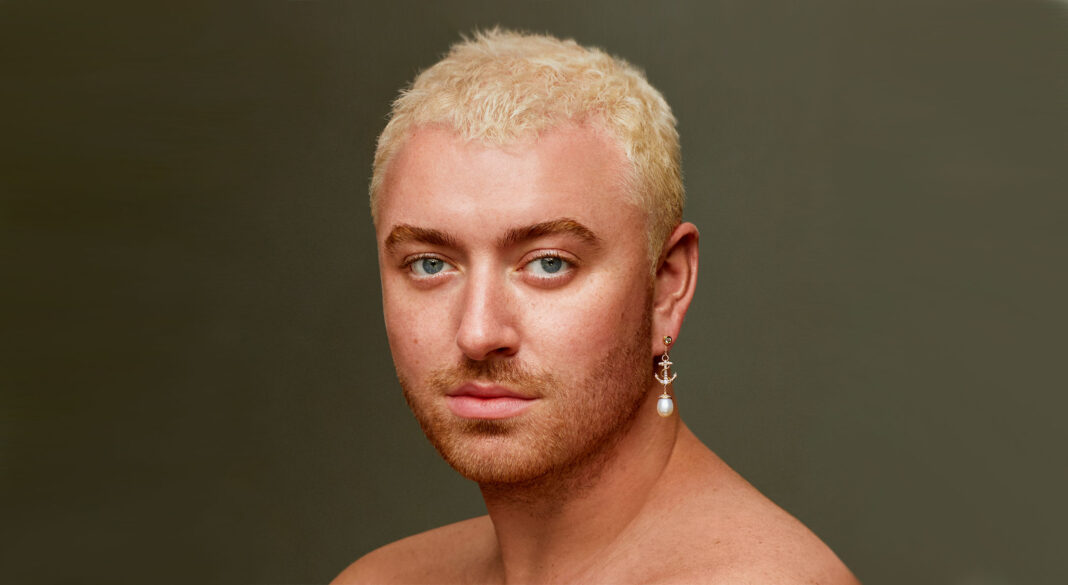Content warning: Mentions of misgendering, queerphobia, fatphobia
A staple of mainstream UK pop, the idea of Sam Smith being a particularly controversial or debatable figure may have seemed quite unlikely in the mid-2010s. With a beautiful voice and penchant for gospel ballads and big collaborations, their presence in the industry was one of stoic talent rather than particular reinvention. And yet, with new album ‘Gloria’ and a fresh embodiment of open queerness via use of ‘they/them’ pronouns and femme fashion, Smith has ignited furious debate about the suitability of their sexualised expression, not least with new music video ‘I’m Not Here To Make Friends’.
We’ll refrain from re-platforming the most vicious of reactions here, but as one might imagine, the folk down at talkRADIO and GBNews (or various tweeters with a Great British flag in their bio) have been getting quite irate about the matter, blaming Smith for spreading a ‘deviant’ agenda that will cause untold damage to impressionable young minds. Just for once, won’t somebody please think of the children?
For anybody who hasn’t yet seen the video (above), here’s a spoiler; by 2023 standards, it’s actually pretty tame. There are twerking bums in heart-cut-out shorts, some leather-BDSM-type writhing on beds (not dissimilar to Lady Gaga’s ‘Judas’ video), and a fair bit of thigh on show from Sam, sporting nipple pasties as they patrol down a corridor like a raunchy deleted scene from Bridgerton. At one point, Smith opens their mouth to receive a stream of Champagne; potentially as a nod to a urination fetish, but not entirely unlike what you’d see on the Formula One podium of a race weekend, or a particular rowdy hen do at your local Turtle Bay. The song itself? Catchy, but again, pretty innocuous; a tale-as-old-as-musical-time of wanting to take someone home at the end of the night, with no individual lyric edgier than the somewhat-fortuitous “don’t be scared if you like it”. Smith described the album ‘Gloria’ as their most authentic yet, but its main themes still broadly boil down to fairly genderless observations of nightlife, self-acceptance, heartbreak and healing, topped off by an Ed Sheeran collaboration right at the end. So why is Smith receiving such extreme levels of outrage? The answer appears to be twofold, and painfully obvious; queerphobia, and fatphobia.
Let’s start with the former. When the world first met Sam Smith back in 2012, they were the featured artist on Disclosure’s ‘Latch’ and Naughty Boy’s ‘La La La’, high-profile mainstream bangers that saw Smith broadly read as heteronormative. When Smith announced that they were gay in 2014, that didn’t cause much disturbance; breakout solo album ‘In The Lonely Hour’ broadly avoided pronoun use in its soulful heartbreak ballads, while the recording of a Bond theme in 2016 (‘Writing’s On The Wall’) did the same, allowing people to project whatever identities or relations suited their listening ears. But when Smith came out as genderqueer in 2017, and then later publicly changed their pronouns to ‘they/them’ in 2019, that was perceived as a whole bridge too far. Suddenly, Smith was positioned as both a trend follower and an attention-seeking troublemaker, intent on disrupting the spaces available for female artists.
Once again, the crueller details of these tired old stereotypes do not bear repeating here, but could be seen in reactions to Smith’s advocacy towards the BRIT awards, suggesting that they should do away with their separately-gendered categories. The BRITs did follow suit, but when the 2023 shortlist for ‘Artist Of The Year’ was announced without a woman on there, many blamed Smith instead of the BRITs, stating that this had been ‘his’ plan all along. Amid the culture wars, Smith was held up as a classic example of everything ‘wrong’ with Britain; brainwashing folk with their silly ideas about gender, infiltrating ‘real’ women and men’s spaces, and demanding pronoun change as a way of feeling ‘special’.
Responses to Smith’s gender identity demonstrate not only how deep-rooted trans and non-binary phobia has become in both the UK and beyond, but how we still have a long way to go in terms of understanding – and appreciating – sexuality that isn’t straight. It’s somewhat ironic that ‘I’m Not Here To Make Friends’ begins with a sample from Ru Paul; while people are happy to watch shows like Drag Race and pillage the ‘slay’ and ‘yasss queen’ phrases of LGBTQIA+ communities, there is still a sense of serious discomfort when queerness is ‘put in our faces’, delivered without apology or coquettish self-censorship. It would be disingenuous to say that there was no public outcry when the Pussycat Dolls or Christina Aguilera released raunchy songs in the 00s, but the way in which queer sexuality is policed in the media often leaves far less space for even relatively-tame innuendo, labelling everything queer as problematically-adult. The hypocrisy is far from subtle; why is it that the same parents who have no problem sexualising their infant children by putting them in ‘daddy’s little heartbreaker/ future ladykiller’ sleepsuits suddenly cry foul when a grown adult man dances with another in a music video? Why are queer artists suddenly the ones most responsible for perpetuating harmful ideas around gender and sex?
The answers run deeper when we consider how Sam Smith looks. Having been open in the past about their struggles with body image, Smith appears to have opened their new ‘Gloria’ album era in a fuller body, having fun with more feminine silhouettes; frothy gowns, knee-high boots, dripping sleeves. The self-acceptance and confidence they exude now is obvious, embracing the full fantasy of pop performance. And yet when Smith stepped out at Jingle Bell Ball in a tightly-fitting glittery catsuit last December, a litany of cruel comments picked apart their appearance, indicating that they should have been embarrassed to have ‘let themselves go’ in this way. That Harry Styles is often seen in incredibly similar outfits reveals a painful truth; society is far more comfortable with fashionable experimentalism when it is on a slim, conventionally attractive body, somebody who experiments with gender rather than fully claiming non-binary status. Much as we have seen with Lizzo, we cannot seem to comprehend a pop star who isn’t chasing thinness as aspiration, who seems to genuinely feel good in exactly who they are. As such, the fatphobia being aimed at Smith is coming not only from conservatives but within the LGBTQIA+ community itself, magnifying the hatred.
Of course, ‘I’m not Here To Make Friends’ is not the first sex scandal in music, and it won’t be the last. Madonna, Queen, and Megan Thee Stallion & Cardi B have all been through it, shrouded in their own struggles with identity politics and perceived respectability. One might even suggest that in courting the seemingly-inevitable pearl-clutching conservatives, Smith has actually played a blinder of a marketing campaign, taking their free promotion as a sign that something is working. But still, there is still no getting around the fact that queer people shouldn’t have to put up with this labour, or risk their artistry being conflated with the horrible, bigoted assumptions of deviancy and paedophilia that queerphobes seem intent on placing at their door. If you want to find wrongdoing and abuse in the music industry, there are no shortage of incidents upon which to direct your fury; a corset and nipple tassels should be the absolute least of anyone’s worries.
Musicians have never been responsible for parenting your children, and even if there were, there are much worse things to see on TV and the internet than an artist singing about self-acceptance and desire, especially if they themselves are queer. If it is broadly understood that straight kids can use media to help them navigate their burgeoning sexualities, why do we assume that queer kids should not be granted the same possibility? The position that Smith is in with their career has the potential to be not only creatively exciting, but pioneering; their ‘Unholy’ collaboration with Kim Petras in 2022 marked the first time that an openly trans or non-binary artist has topped the charts. You don’t have to like Sam’s artistic development, but if you’re not willing to defend their right to pursue it, it may be worth asking yourself if ‘the children’ are really what you’re worried about.








Sorry… but Sam Smith’s Unholy video is creepy. I don’t care about his sexuality but the imagery is very disturbing and awful.
Who needs this crap?